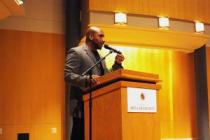AWARD-WINNING POET THEO WILSON DISCUSSES ACTIVISM IN AN INCREASINGLY RACIALLY CHARGED WORLD
COLLEGE PARK, Md. – Over 150 people filled the Gildenhorn Recital Hall at The Clarice Smith Performing Arts Center on Wednesday night to hear award-winning slam poet and social justice advocate Theo Wilson, who appeared as part of the University of Maryland College of Arts and Humanities Dean’s Lecture Series.
Wilson skyrocketed to social media fame after posting beliefs about hate and bias. During his lecture, he discussed his experiences as a black man in an increasingly digital and racially charged world.
Wilson went undercover in white supremacist online communities to “get a gist of the gathering storm” because “nothing is more dangerous for black people than white supremacy.”
While undercover, he learned how social media creates digital echo chambers that steer users toward content that affirms their ideological beliefs. He also learned about the dangers of groupthink, a psychological phenomenon in which a group of people make irrational decisions based on the desire for harmony. Noticing how alt-right online communities gained momentum through these realities propelled his career as an activist.
Throughout the lecture, he detailed events that changed the way he thought about his own race. From the racially motivated bombings at Florida A&M University, a historically black college, in 1999, to the election of George W. Bush in 2001, Wilson described how race permeated his everyday life.
Wilson began his public speaking career in the NAACP at the age of 15, and has always had a passion for social justice. He helped found the Denver Slam Nuba team, which won the National Poetry Slam in 2011. Wilson also performed at this year’s TEDxMileHigh event.
He concluded his lecture by reciting a slam poem called “Impossible,” which expressed the possibility of the impossible and the barriers African Americans have overcome. The poem captivated the audience as Wilson proclaimed “My breath is like humanity/ Limitless/ Unbounded/ And impossibly free.”
During a question and answer session moderated by Linda Aldoory, associate dean for research and programming, Wilson responded to questions about slam poetry, his personal utopia and a world without racism.
Wilson ended his performance by reminding the audience that “there’s this new generation that has this attitude that’s unbreakable,” and encouraged the continuation of self-expression.





